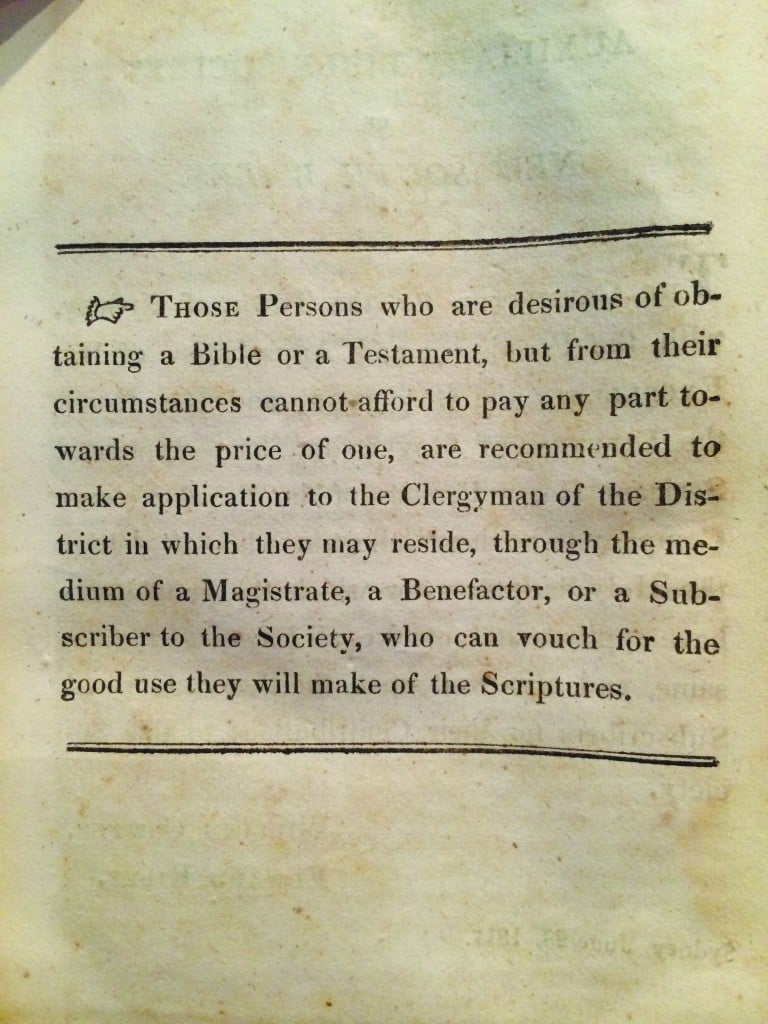Turning 199 feels important, but scary – probably because I love cricket, and the thought of getting dismissed on that number is just horrible. Only eight batsmen ever have (and no women, yet!), including current Australian captain, Steve Smith. It’s just a number, but the adrenalin coursing through one’s veins as the bowler pounds in is that much harder to handle when you are on 199.
 With adrenalin coursing, the Bible Society has reached that tremendous number. Back in March 1817, an auxiliary branch of the British and Foreign Bible Society was founded here by colonials who, among other things, went on to found the first bank a month later (now Westpac). Governor Lachlan Macquarie, Samuel Marsden, William Cowper, Eyre, Redfern, Macarthur, Wentworth: names that we hear now as suburbs or schools or electorates. These were the founders of Bible mission in Australia 199 years ago, and we owe them a great debt.
With adrenalin coursing, the Bible Society has reached that tremendous number. Back in March 1817, an auxiliary branch of the British and Foreign Bible Society was founded here by colonials who, among other things, went on to found the first bank a month later (now Westpac). Governor Lachlan Macquarie, Samuel Marsden, William Cowper, Eyre, Redfern, Macarthur, Wentworth: names that we hear now as suburbs or schools or electorates. These were the founders of Bible mission in Australia 199 years ago, and we owe them a great debt.
On my desk I have the first Bible Society report from 1817, including the names and donations of all benefactors that year (the Empire produced impeccable paperwork). The Governor himself was the largest contributor, along with many of the colony’s leaders. Their aim, eloquently expressed by Rev Marsden, was “for no less a purpose than to aid and assist in distributing the word of God – the Bread of Eternal Life – to the poor perishing souls of our fellow creatures”.
My heart thrills at the emphasis on ensuring that Bibles were made available for the poor, for women, “poor prisoners” and “mechanics, labourers and others”. Clearly, they thought everyone deserved access to the word of God.
“Men of all ranks and stations in a society stand in equal need of this blessed volume,” said Marsden (clearly implying women and children, as well).
How delightful are these words of encouragement to families, published in the Sydney Gazette a week later (15 March 1817): “The lonely settler, who can read, or has anyone about him who can read, but is nevertheless without a Bible, will now find a means of collecting his little household about his fire side, and instead of passing away his evenings idly and without delight, listen to those lessons of instruction that will at once amuse and gratify him more than any other book, or any other manner in which he could have employed the space of unproductive leisure”.
Contrary to the view that the Bible was merely wielded from the pulpits, we are given a picture of Scripture reading as an entertaining, fulfilling part of a pleasurable evening together as a family. The Bible contributes to private and public good, a position that needs to be promoted more effectively today. People were encouraged to read from it “before you enter the labours of the day” with “delightful consequences to flow from the practice”. The Bible would change the feel of the day. Taste and see that the Lord is good!
As a national organisation, Bible Society Australia will mark our bicentenary from this point: noon on 7 March 1817, when the society began in Australia. It’s not just a New South Wales celebration; it’s for everyone. We have made it through the nervous nineties and, God-willing, shall celebrate our double century and beyond. Our task is not yet fulfilled, and so we assume many overs at the crease are still required. As Samuel Marsden said in that first report, “From the exertions that [we] are now making to disseminate the Scriptures, we may reasonably hope that the Bible will soon be found in every part of the world, when every enquiring soul may learn the mind and will of God”.
Greg Clarke is CEO of Bible Society Australia.
Email This Story
Why not send this to a friend?
